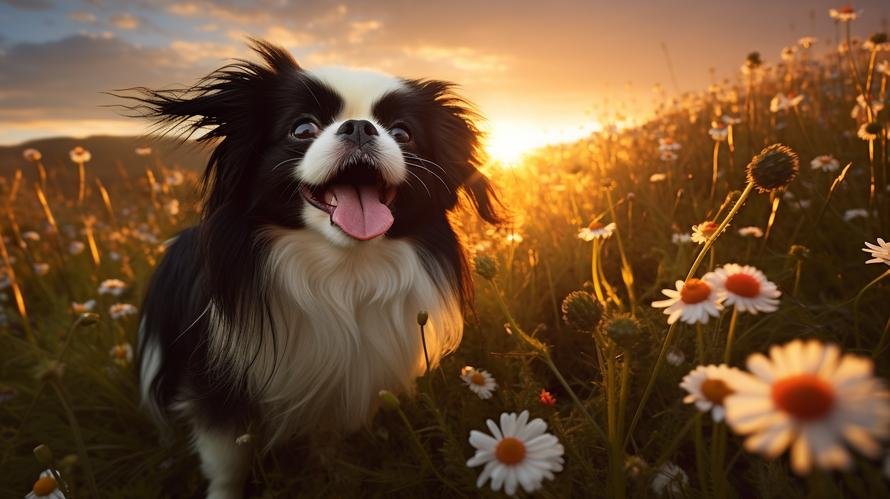Believe it or not, the Japanese Chin is considered a cat in dog’s clothing! How so, you might ask? Well, these agile little pets have cat-like habits such as grooming itself, enjoying high places with a knack for climbing, and showing a high level of independence. That’s right, a dog that thinks like a cat!
Despite this quirky habit, the Japanese Chin is often described as charming, loving, and intelligent. This breed hails from the Land of the Rising Sun, Japan, where it has been a favored companion to Japanese nobility for centuries. Given such a unique reputation, it’s natural to wonder whether this breed might be aggressive.
Before we answer that question, let’s indulge our curiosity and voyage back in time. You’ll be fascinated to know that the Japanese Chin has a vibrant history shrouded in mystery. Historically known as the “Japanese Spaniel”, they weren’t a breed commoners could easily own. These dogs were often used as valuable gift items, exchanged amongst royalty. Not just in Japan, but across Asia and Europe alike, they were seen as symbols of prestige and honor.
One may conjecture that their royal upbringing might render them snooty or aggressive. Well, my friend, here’s your answer: Not true! Japanese Chins are well-known for their amiable, non-aggressive nature, thus shattering all possible royal canine stereotypes.
While their past is fascinating, you might be wondering how this translates to their personality today. Will they prance around your living room, expecting royal treatment? Will a misplaced footstep lead to an aggressive bite? The answers to these questions are, in most cases, resounding ‘nos’. But as responsible pet owners, we shouldn’t rule out the possibility entirely; understanding the breed is essential before introducing a Japanese Chin to your family.
Japanese Chins, true to their unique character, are not known for their aggression; instead, they’re cherished for their loving and gentle nature. These dogs are like a fluffy ball of warmth that enjoys nothing more than companionship. However, like any other breed, each Japanese Chin is a unique individual and can display different personality traits.
Japanese Chins thrive in environments where they’re showered with love and attention. Remember the old phrase, ‘what you give is what you get back’? It fits perfectly in this context. Treat your Chin with kindness and patience, and you’re likely to have a sweet and loving companion in return.
Training and socializing can also play an instrumental role when it comes to curbing any potential aggression in your Japanese Chin. As puppies, socializing them with different people, environments, and other pets can help lay a solid foundation for a well-rounded, non-aggressive dog. Firm, but gentle training from a young age can also make a world of difference.
You might be wondering if it’s safe to have a Japanese Chin around children. The answer is a hearty yes! Japanese Chins generally get along well with children. Their small size makes them less intimidating for kids, although it’s always advised to supervise interactions between pets and young children to prevent any accidental harm to either party.
However, Japanese Chins can be somewhat sensitive, so it’s important to make sure they aren’t teased or handled roughly. This might trigger undesired behaviors or fear-based aggression in very rare cases.
Section aside, this amicable, intelligent breed makes a wonderful family pet. They bring joy, warmth, and a unique personality to homes, ensuring life is never dull!
Before we wrap up, here are a few quick health tips for our fuzzy companions. Japanese Chins are prone to certain health conditions including heart murmurs, cataracts, and luxating patellas. A balanced diet and regular vet check-ups can promote a long, healthy life for your Japanese Chin.
In conclusion, if you’re looking for a non-aggressive, loving, and unique pet companion, a Japanese Chin could well be your perfect match. It’s a breed capable of winning hearts with its earnest eyes and charming quirks. But remember, a well-behaved pet is often a reflection of a loving, responsible pet-owner. So, treat your pet with kindness and respect, nurture its needs, and you’ll be rewarded with a loving, loyal companion.



